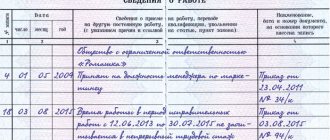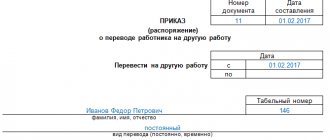Employment rules
According to the Labor Code, any hiring process consists of several stages:
- first: the employee undergoes an interview and brings the necessary package of documents to the enterprise;
- second: the employer and employee enter into an employment contract;
- third: an order is issued for the enterprise to hire a new employee.
According to the hiring rules, an employee is considered hired from the moment he begins work, regardless of whether an employment contract has been signed.
First stage of recruitment
Job interview
As a rule, to hire a new employee, an interview is scheduled, during which they check whether the candidate meets not only the requirements for the vacant position, but also the overall image and policy of the enterprise. At the same time, the employer has the right to set the requirements for hiring himself, of course, within reason. That is, an employer can demand from a candidate for a position knowledge of a foreign language, if it is useful in professional activities, but the ability to sing in a bass voice and pronounce five tongue twisters in a row without hesitation cannot.
It is best if the hiring rules: qualification requirements, special education, work experience, probationary period, etc. are agreed upon and spelled out in advance.
Documents provided by the employee
According to the terms of employment, the employee is required to provide the following documents to the enterprise:
- identification card - usually a passport;
- identification code;
- work book - unless the employee is employed for the first time or is employed part-time;
- certificate of state pension insurance - if not getting a job for the first time;
- military registration documents - if subject to military conscription.
If the position requires special qualities and skills, the employer may, at its own discretion, expand the list of documents, for example, include a certificate of higher education or medical certificates. In this case, the documents must indicate only the professional qualities of the employee, which are important in his future work, and not, for example, about his religious views or political beliefs.
Documents provided by the employer
Before signing an employment contract under the terms of employment, the employer is obliged to familiarize the future employee with the following documents:
- internal labor regulations;
- labor protection documents;
- regulations on the structural unit and job description;
- work schedule and salary regulations;
- draft employment contract.
If necessary, the employee is also introduced to the provisions on trade secrets and other internal documents of the enterprise that will guide the employee in his activities.
Second stage of recruitment
Before the employee begins to perform his duties, he must sign an employment contract. This document is drawn up according to a standard form and includes all the nuances of the labor relations of the parties (employee and employer): deadlines for completing work, work and rest schedules, payment, working conditions, conditions for terminating employment relations and resolving labor disputes, and so on.
When concluding an employment contract, the employer must remember that there are some restrictions on hiring.
Restrictions on hiring
According to current legislation, there are the following nuances:
- It is prohibited to conclude an employment contract with persons under sixteen years of age; in some cases it is possible to conclude an employment contract with persons over fourteen years of age with the consent of their parents. At the same time, it is strictly prohibited to accept minors for certain types of work, for example, on a part-time basis or in work with harmful conditions;
- It is prohibited to employ managers and certain other categories of citizens on a part-time basis;
- It is prohibited to accept for work that involves financial responsibility those previously convicted of theft and similar crimes;
- at state enterprises there are restrictions on part-time work, as well as on the employment of close relatives on the basis of subordination;
- It is prohibited to employ persons who, after graduating from an educational institution, received assignment to another employer.
Third stage of recruitment
After concluding an employment contract, an order is issued for the enterprise to hire a new employee. The order is drawn up in a unified form and contains the conditions of work and remuneration of the employee. The employee must be familiarized with this order within three days against signature.
During the interview
Smile
Yes, a job interview is a high-pressure situation, but nervousness can hurt your first impression. Smiling naturally will make you appear confident, friendly, and approachable. A smile says that you are someone who can get along with colleagues and impress clients.
Take some water
If the person you're talking to offers you a glass of water, take it even if you're not thirsty. This little prop can help buy you time to formulate an answer to a difficult question or just give you a couple of seconds to focus on yourself.
Don't talk too fast
There is a tendency to speak even faster when excited (for example, in a job interview). This makes it difficult for interviewers to understand what you are saying! What should you do if you are one of those people who starts chattering when nervous? First, take a couple of sips of the water you were just offered. Secondly, try to control yourself and the speed of your speech. Remember that you prepared for this interview and rehearsed your answers to the questions.
Ask questions
Keep in mind that a job interview is an opportunity to learn more about the workplace to see if it's a good fit for you. Go with a few questions such as details about the job, company culture and career opportunities.
Ask how long it will take to make a decision
This will help you in your future job search. This is important because you will likely be interviewing with other companies at the same time and receiving other offers.
Recruitment criteria
p>
It should be noted that each employer sets the criteria and requirements for candidates for a position, based not only on considerations of selecting qualified personnel, but also often on personal considerations. For example, it is not uncommon for managers to select secretaries of a certain type of appearance. And in this case, when hiring, the HR department’s task is not only to select a professional, but also to conduct a selection based on external characteristics.
By and large, such selection is illegal, since it discriminates against all other candidates, but if the employer can prove that the refusal to hire the others was justified, he has the right to take such actions.
Remote worker: 5 rules for effective work from home
Photo: @pernilleteisbaek
International time management expert, founder of the Woman Time Academy for Women's Development, Skolkovo speaker Ekaterina Bespyatykh on how to make working from home as efficient as possible.
Remote work, despite all the abundance of positive aspects, has one significant drawback: without strict outside control, it is difficult to resist spending a couple of hours on activities that are far from professional duties. But very soon it becomes clear how much our productivity suffers from these seemingly harmless things. What needs to be done to prevent self-isolation from harming your career?
Plan your busyness
The day will be productive if the day before you draw up a detailed action plan indicating the time allotted for each of them. For these purposes, you can use various extensions and applications, for example Momentum, Remember the Milk, Trello and others. Set reminders for important tasks - they will not allow you to get distracted for a long time and miss the deadline.
However, even the most detailed plan will not work without self-discipline. Therefore, if you know that you cannot resist viewing entertainment sites, you can block them during the working day. For example, using the RescueTime application.
Use helpers
Some tasks can be completed faster if you automate them. For example, instead of typing text by hand, speak it in TalkTyper or Speechpad. Select programs depending on your work profile and take the time to spend a few hours mastering new software.
Photo: @mvb
Work as a team
Try to establish regular communication with your colleagues. This will prevent you from falling out of the working rhythm, will help mobilize your strength and maintain a business atmosphere. It is best if you call each other at the same time every day - in order to agree on the procedure for current tasks or report on their completion.
Get ready for the work day
With all the advantages of remote work, first and foremost it is work. And you need to psychologically restructure yourself in order to perceive your home chair and computer as a workplace. Following the usual rituals that you perform before going to the office will help with this. For example, change your clothes. Of course, there is no need to adhere to a strict dress code. But even in jeans and a jumper, it will be easier to adjust to the office rhythm than in a lounge suit or pajamas.
Take advantage of remote work
To be productive, proper rest and a positive attitude are vital. Therefore, from time to time during your home work day, allow yourself joys that are not available when surrounded by colleagues and in the presence of your superiors. For example, during a break, do a workout or take a shower. And most importantly, don’t forget that even when working remotely, you need weekends to devote to relaxation, family, friends or your hobbies.
Hiring Qualities
As mentioned above, each employer sets its own requirements for candidates: some will give preference to desperate careerists, others, fearing competition, will recruit employees exclusively from the “gray mouse” category. But there are a number of qualities that every employer pays attention to:
- the candidate's appearance;
- the candidate’s manner of behavior and communication;
- recommendations for hiring;
- the degree of self-confidence of the candidate;
- professional skills and experience in this field.
ipinform.ru
First interview - how to behave?
We discussed in general terms how to behave at an interview to get hired. The only thing they didn’t touch on was appearance . Meanwhile, people are greeted by their clothes. Especially if there is an interview with the director, how should you behave in this case?
In most cases, the requirements for appearance are identical, so we suggest you familiarize yourself with how to dress correctly: business suit, hairstyle, minimum makeup (for girls), complete absence of bright details (accessories, lipstick, nail polish, etc.). Having too expensive items will also be inappropriate.
How to behave at an interview to please the employer
- Pay attention to your voice : it should be moderately sonorous, speech should be coherent and free, there should be a pause between phrases, questions and answers.
- Get rid of stiffness .
- Watch your gestures and posture . Practice in front of a mirror.
- You must create the opinion of a serious and confident person . And your embarrassment and constraint will be transmitted to your interlocutor, and he will feel uncomfortable, which will negatively affect the general opinion of you.
Solve problems, not create them
The most valuable employee in an organization is a unique specialist who knows how to do what others cannot do. If the manager talks about difficulties, do not sigh and be sad, think about what help you can offer on your part. Generate ideas, don’t be afraid of work, demonstrate your ambitions delicately - and you can not only quickly get used to the new team, but also confidently climb the career ladder.
Back Next
Don't remember past work
It’s neither out of place nor out of place to talk about what bonuses and wonderful conditions there were at your previous job. Also, you should not criticize your previous employer while singing the praises of your current one. If they don't ask you about the past, don't start the conversation. The fact of constantly returning to old traditions, the office, the structure of the working day and wonderful (or unbearable) colleagues devalues the people who are with you at the moment.
It is especially important not to share your strategy for managing people more effectively at your previous job with your current manager. Do not engage in verbal battles with the director if you do not already have authority and if this is not accepted in this organization. It is especially important to refrain from making comments and comparisons in the presence of several people. If current colleagues are actively interested in how the ladies were congratulated on March 8 in your previous organization, you can talk about this without giving ratings.
How does the interview begin?
Many compare this procedure to the interrogation of witnesses in court.
There are certainly similarities.
In both cases, only the truth is required, although one of the parties has the opportunity “not to incriminate himself.”
The similarities lie in the first questions. They always precede the main ones and contain primary information about the applicant.
Prepare to be asked about the following points:
- reasons for leaving previous work;
- reasons for wanting to work in this particular organization;
- the applicant’s contribution to the well-being of the company;
- the greatest strengths and weaknesses of the applicant;
- the most significant achievements in the professional field.
The most tricky question is the question of the reasons for leaving your previous job. Never speak negatively about the previous organization, its leadership and staff. It is best to limit yourself to arguments of a pragmatic nature: travel far to work, wages are not paid regularly, inconvenient work hours, etc.









